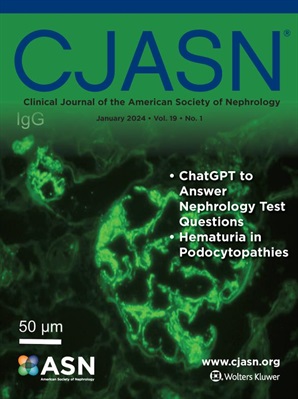慢性肾病患者和肾移植受者的睡眠障碍
IF 8.5
1区 医学
Q1 UROLOGY & NEPHROLOGY
Clinical Journal of the American Society of Nephrology
Pub Date : 2025-04-09
DOI:10.2215/cjn.0000000728
引用次数: 0
摘要
失眠、不宁腿综合征(RLS)和睡眠呼吸暂停等睡眠障碍在慢性肾病(CKD)患者中很常见。随着肾功能恶化和患者达到终末期肾病(ESKD),这些情况往往变得更加普遍和严重。与CKD患者、血液透析患者、腹膜透析患者(PD)和肾移植患者(KTRs)相比,一般人群中失眠的患病率为4-29%,分别为i) 30-67%、ii) 39-54%、iii) 41-79%和iv) 9-49%。一般人群中发生RLS的比例约为1-15%,而CKD患者、血液透析患者、PD患者和ktr患者分别为i) 5-18%、ii) 24-33%、iii) 23-64%和iv) 6-8%。据报道,慢性肾病患者、血液透析患者、PD患者和ktr患者的阻塞性睡眠呼吸暂停发生率分别为i) 40-69%、ii) 25-47%、iii) 9-52%和iv) 25-30%。疲劳是一种复杂的症状,在CKD、ESKD和KTRs患者中都有报道,并且可能与睡眠障碍有关。疲劳和睡眠障碍与负面结果相关,如CKD进展、发病率、死亡率风险增加和健康相关生活质量降低。在这篇综述中,我们强调了治疗这些睡眠障碍的非药物和药物选择。具体而言,诊断和评估,流行病学,危险因素和关联,结果(如CKD进展,发病率和死亡率),治疗和移植后的睡眠障碍(失眠,睡眠呼吸暂停,睡眠呼吸暂停)和疲劳的结果将被讨论。本文章由计算机程序翻译,如有差异,请以英文原文为准。
Sleep-Related Disorders in Patients with Chronic Kidney Disease and Kidney Transplant Recipients.
Sleep disorders such as insomnia, restless legs syndrome (RLS), and sleep apnea are common in patients with chronic kidney disease (CKD). These conditions tend to become more prevalent and more severe as kidney function deteriorates and when a patient reaches end-stage kidney disease (ESKD). The prevalence of insomnia in the general population ranges from 4-29% compared to i) 30-67%, ii) 39-54%, iii) 41-79%, and iv) 9-49% in patients with CKD, on hemodialysis, on peritoneal dialysis (PD), or in kidney transplant recipients (KTRs) respectively. RLS occurs in about 1-15% of the general population compared to i) 5-18%, ii) 24-33%, iii) 23-64%, and iv) 6-8% in patients with CKD, on hemodialysis, on PD, or in KTRs respectively. Obstructive sleep apnea has been reported in i) 40-69%, ii) 25-47%, iii) 9-52%, and iv) 25-30% in patients with CKD, on hemodialysis, on PD, or in KTRs respectively. Fatigue is a complex symptom that has been reported in patients with CKD, ESKD, and in KTRs and can be associated with sleep disorders. Fatigue and sleep disorders have been associated with negative outcomes such as progression of CKD, increased risk of morbidity, mortality, and lower health-related quality of life. In this Review, we highlight non-pharmacologic and pharmacologic options for treatment of these sleep disorders. Specifically, the diagnosis and evaluation, epidemiology, risk factors and associations, outcomes (such as CKD progression, morbidity, and mortality), treatment, and post-transplant outcomes for sleep disorders (insomnia, RLS, sleep apnea) and fatigue will be discussed.
求助全文
通过发布文献求助,成功后即可免费获取论文全文。
去求助
来源期刊
CiteScore
12.20
自引率
3.10%
发文量
514
审稿时长
3-6 weeks
期刊介绍:
The Clinical Journal of the American Society of Nephrology strives to establish itself as the foremost authority in communicating and influencing advances in clinical nephrology by (1) swiftly and effectively disseminating pivotal developments in clinical and translational research in nephrology, encompassing innovations in research methods and care delivery; (2) providing context for these advances in relation to future research directions and patient care; and (3) becoming a key voice on issues with potential implications for the clinical practice of nephrology, particularly within the United States. Original manuscript topics cover a range of areas, including Acid/Base and Electrolyte Disorders, Acute Kidney Injury and ICU Nephrology, Chronic Kidney Disease, Clinical Nephrology, Cystic Kidney Disease, Diabetes and the Kidney, Genetics, Geriatric and Palliative Nephrology, Glomerular and Tubulointerstitial Diseases, Hypertension, Maintenance Dialysis, Mineral Metabolism, Nephrolithiasis, and Transplantation.

 求助内容:
求助内容: 应助结果提醒方式:
应助结果提醒方式:


